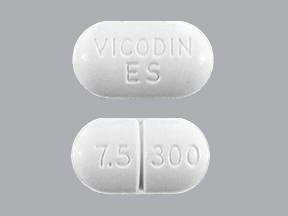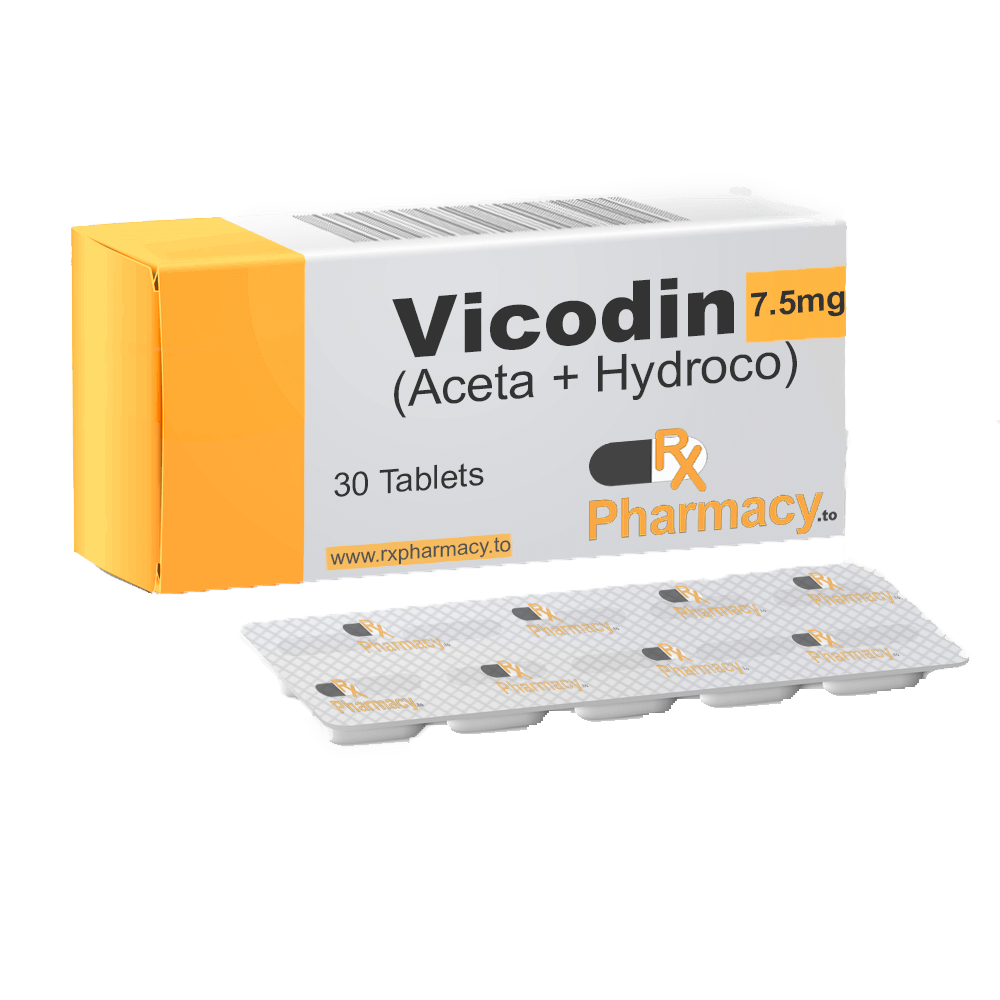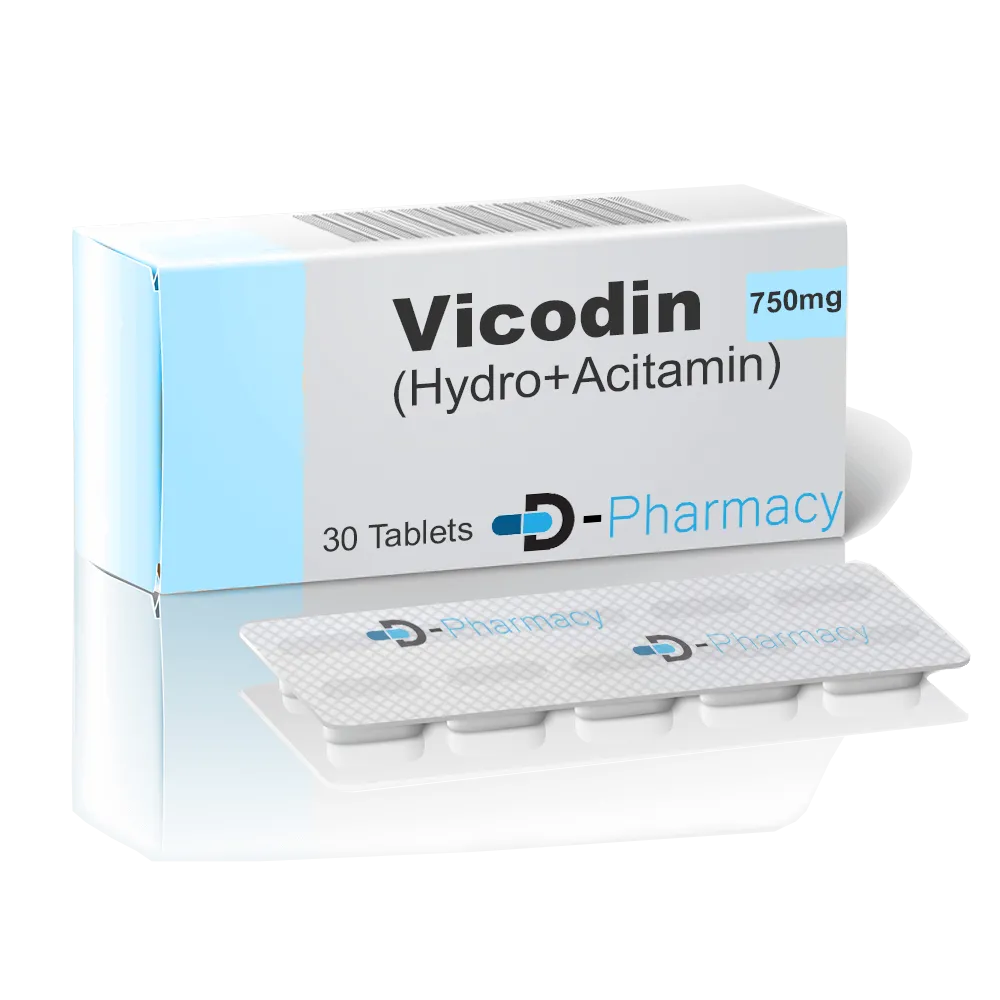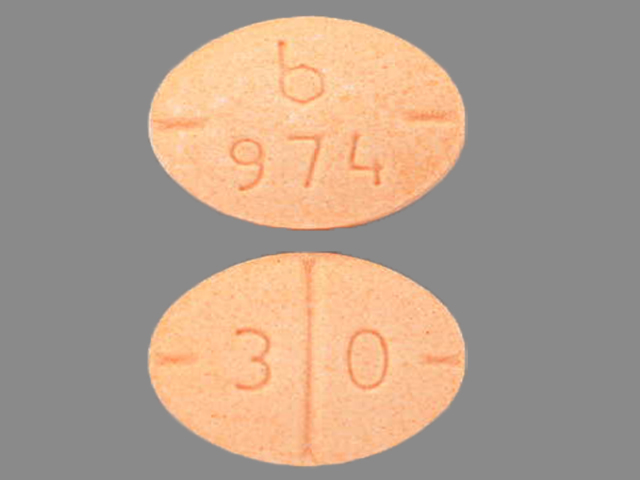Vicodin: A Comprehensive Guide to Pain Management
Pain is a universal human experience, and it can vary widely in intensity, duration, and cause. Whether it’s the result of an injury, a medical condition, or surgery, pain can be physically and emotionally distressing. In the quest for relief, healthcare providers often turn to medications like Buy Vicodin Online. In this comprehensive guide, we will delve into what Vicodin is, how it works, potential side effects, proper usage, and alternative approaches to pain management. By the end of this article, you will have an in-depth understanding of Vicodin and its vital role in effectively managing Back pain.
Understanding Vicodin
Vicodin is a prescribed drug that blends two active components: hydrocodone and acetaminophen. Each of these components plays a unique role in providing pain relief, and together they create a powerful tool in the fight against pain.
Hydrocodone:
At the core of Vicodin’s pain-relieving properties is hydrocodone, a potent opioid analgesic. Opioids like hydrocodone work by binding to specific receptors in the brain and spinal cord known as opioid receptors. This interaction leads to a profound alteration in the perception and processing of pain signals within the central nervous system.
When pain signals are sent from an injury or source of discomfort to the brain, they are interpreted as pain sensations. Hydrocodone’s binding to opioid receptors dampens this perception, effectively reducing the sensation of pain. This makes hydrocodone a valuable component of Vicodin for individuals dealing with moderate to severe pain.
Acetaminophen:
The second active ingredient in Vicodin is acetaminophen, a non-opioid pain reliever and fever reducer. While it may not have the same direct impact on the central nervous system as opioids, acetaminophen plays a crucial role in enhancing the overall pain-relieving effects of Vicodin.
Acetaminophen works by inhibiting certain chemicals in the brain that are involved in pain and fever responses. By reducing fever and inflammation, it can help further alleviate pain, making it a valuable complement to hydrocodone in Vicodin.
How Vicodin Helps with Pain Relief
Pain is a complex and highly individualized experience, and its management often requires a multifaceted approach. Vicodin, a medication combining hydrocodone and acetaminophen, is a valuable tool in the arsenal against various types of pain. In this section, we will explore how Vicodin helps with pain relief and the specific conditions it can address.
1-Post-Surgical Pain:
After surgery, pain management is a critical aspect of the recovery process. Surgical procedures can lead to significant discomfort, and effective pain relief is essential for both physical and psychological well-being. Vicodin is often prescribed for short-term use in the post-operative period to help manage pain. By alleviating post-surgical pain, Vicodin enables individuals to recover more comfortably and with less distress. This, in turn, can promote a smoother and faster recovery.
-
Chronic Pain:
Chronic pain is a persistent and often debilitating condition that affects millions of individuals worldwide. It can result from various underlying causes, including arthritis, fibromyalgia, neuropathy, and lower back pain, among others. When other treatments have not provided sufficient relief, Buy Vicodin Online may be considered as an option for managing chronic pain.
In cases of chronic pain, Vicodin can offer relief by modifying how the central nervous system perceives and processes pain signals. This modulation of pain perception can significantly improve the quality of life for individuals who have been living with persistent discomfort. It allows them to engage in daily activities, maintain a level of functionality, and experience a reduction in the emotional burden often associated with chronic pain.
-
Acute Pain:
Acute pain is typically of short duration and arises suddenly, often because of injuries, dental procedures, or other transient issues. Vicodin can be a highly effective choice for managing acute pain, as it provides rapid relief while the body heals. By alleviating acute pain, Vicodin contributes to the patient’s comfort and facilitates the healing process.
For instance, a person who has undergone dental surgery may experience significant pain in the immediate aftermath. Buy Vicodin Online can be prescribed for a short duration to manage this acute pain, allowing the individual to eat, drink, and speak with less discomfort during the initial recovery period.
-
Pain Management for Terminal Illness:
In cases of terminal illnesses or severe pain conditions, maintaining a reasonable level of comfort and quality of life is a top priority. Vicodin can be a valuable component of a comprehensive pain management plan for individuals facing these challenging circumstances. It works to alleviate pain and improve overall well-being, allowing individuals to spend their remaining time with greater dignity and reduced suffering.
For patients with terminal cancer, for example, Vicodin may be prescribed to manage the often-excruciating pain associated with the disease. By effectively relieving pain, Vicodin enables patients to focus on spending precious time with loved ones and addressing important end-of-life matters.
It’s important to note that the use of Vicodin for pain management should always be guided by a healthcare provider’s recommendations and should consider the potential risks and benefits. While Vicodin can provide substantial pain relief, it is not without its potential side effects and risks, particularly when used inappropriately or for extended periods. Healthcare providers carefully assess everyone’s unique circumstances and pain management needs to determine the most appropriate treatment plan.
Side Effects of Vicodin
Vicodin, a medication combining hydrocodone and acetaminophen, is an effective pain reliever that can provide significant relief for various conditions. However, like all medications, Buy Vicodin Online is associated with potential side effects. It’s essential for individuals using Vicodin and healthcare providers prescribing it to be aware of these side effects to make informed decisions about its use. In this section, we will discuss common and less common side effects of Vicodin.
Common Side Effects of Vicodin:
1-Drowsiness:
Drowsiness is one of the most common side effects of Vicodin. Hydrocodone, the opioid component of Vicodin, can have a sedative effect on the central nervous system. This drowsiness can impair a person’s ability to concentrate and perform tasks that require alertness, such as driving or operating heavy machinery.
2-Constipation:
Opioids like hydrocodone are notorious for causing constipation. They slow down the movement of stool through the intestines, leading to difficulty in passing bowel movements. This side effect is so prevalent that healthcare providers often recommend preventive measures such as increasing dietary fiber and fluid intake or using over-the-counter laxatives.
3-Nausea and Vomiting:
Nausea is another common side effect of Vicodin. Some individuals may also experience vomiting. Taking Vicodin with food or as directed by a healthcare provider can help reduce these gastrointestinal side effects.
4-Dizziness and Lightheadedness:
Vicodin can cause dizziness and lightheadedness, especially when standing up from a seated or lying position. It’s important to move slowly and be mindful of changes in position to prevent falls or accidents.
5-Itching:
Itching, or pruritus, may occur as a side effect of Vicodin. While it is generally not severe, it can be uncomfortable. If itching becomes problematic, consult your healthcare provider for recommendations.
6-Headache:
Some individuals may experience headaches as a side effect of Vicodin. Over-the-counter pain relievers, with your doctor’s approval, may help alleviate this symptom.
8-Dry Mouth:
Dry mouth, also known as xerostomia, may occur while taking Vicodin. Staying hydrated and using sugar-free gum or lozenges can provide relief from a dry mouth.
Less Common Side Effects of Vicodin
While less common, Vicodin can also lead to other side effects that may require medical attention. These include:
1-Confusion:
In some cases, Vicodin can cause confusion, memory problems, or difficulty concentrating. These cognitive side effects should be reported to a healthcare provider.
2-Hallucinations:
Hallucinations, including visual and auditory hallucinations, can occur in rare instances when taking Vicodin. These experiences can be frightening and should be reported to a healthcare provider promptly.
3-Respiratory Depression:
Respiratory depression is a potentially life-threatening side effect of opioids like hydrocodone. It involves slow or shallow breathing and requires immediate medical attention. If you or someone you know has trouble breathing while taking Vicodin, seek emergency care.
4-Allergic Reactions:
Allergic reactions to Vicodin are uncommon but can be serious. Symptoms may include hives, itching, swelling of the face, lips, tongue, or throat, severe dizziness, and difficulty breathing.
5-Liver Issues:
The acetaminophen component of Vicodin can be toxic to the liver when taken in excessive amounts. Symptoms of liver problems, including acetaminophen-induced liver toxicity, may include yellowing of the skin or eyes (jaundice), dark urine, or persistent abdominal pain.
It’s important to note that the side effects of Vicodin can vary from person to person. While some individuals may experience several side effects, others may experience none. The likelihood and severity of side effects can depend on factors such as the dosage, duration of use, individual tolerance, and any preexisting medical conditions.
Habit-Forming Nature of Vicodin
Vicodin is classified as an opioid medication. Opioids are known for their habit-forming nature, which means they have the potential to lead to physical and psychological dependence. When used over an extended period or not as prescribed, individuals may develop a tolerance, requiring higher doses to achieve the same pain relief.
Strict Adherence to Prescription:
Always adhere to your healthcare provider’s instructions regarding Vicodin usage. Follow the recommended dosage and duration precisely. Do not alter your dose without consulting your healthcare provider first.
Monitoring for Side Effects
Vicodin, like all medications, can cause side effects. Typical adverse effects encompass sensations of dizziness, drowsiness, nausea, vomiting, constipation, and a sense of lightheadedness. It’s essential to be vigilant and aware of these potential side effects, especially when starting the medication or if there are any changes in your treatment plan. Here’s what you should do:
Monitor for Side Effects:
Pay close attention to how Vicodin affects your body. If you experience any side effects, report them to your healthcare provider promptly. They can help manage or adjust your treatment plan accordingly.
Avoiding Alcohol
Combining Vicodin with alcohol is a dangerous practice that should be strictly avoided. Both substances depress the central nervous system, leading to respiratory depression, extreme drowsiness, and an increased risk of overdose. To stay safe and treat depression use Xanax.
Avoid Alcohol:
Do not consume alcohol while taking Vicodin. Inform your healthcare provider of any alcohol consumption to ensure your safety and well-being during treatment.
Safe Storage and Preventing Unauthorized Use
Safe storage of Vicodin is crucial to prevent unauthorized access, especially by children or individuals who may misuse the medication. Here are some steps to ensure secure storage:
Safe Storage:
Keep your Vicodin in a secure location that is out of reach of children and inaccessible to others. Consider using a lockable medicine cabinet or a safe for added security.
Monitor Pill Count:
Keep track of the number of pills remaining in your prescription bottle. This will help you detect any potential misuse or theft.
Dispose of Unused Medication:
Properly dispose of any unused Vicodin. Many communities have drug take-back programs, or your healthcare provider can provide guidance on safe disposal methods.
Risk of Overdose
Taking more Vicodin than prescribed or using it more frequently than recommended can lead to an overdose. Overdosing on Vicodin can result in severe respiratory depression, unconsciousness, and, in some cases, death. To prevent overdose:
Adhere to Prescribed Dosage:
Always take Vicodin according to your healthcare provider’s prescription. Do not take more than instructed.
Seek Immediate Help:
If you suspect an overdose or experience symptoms like slowed or shallow breathing, extreme drowsiness, or confusion, seek immediate medical attention by calling emergency services.
Interaction with Other Medications
Vicodin can interact with other medications you may be taking. These interactions can lead to adverse effects or reduce the effectiveness of Vicodin. To prevent complications:
Pregnancy and Breastfeeding
If you are pregnant, planning to become pregnant, or breastfeeding, it’s essential to discuss the use of Vicodin with your healthcare provider. Opioid use during pregnancy can have potential risks to the fetus, and opioids can pass into breast milk, affecting the nursing infant. Your healthcare provider can help you make informed decisions and explore alternative pain management options if necessary.
Conclusion:
Vicodin is a potent medication that plays a crucial role in pain management, offering relief to individuals grappling with various forms of pain, ranging from post-surgical discomfort to chronic conditions and even terminal illnesses. By combining hydrocodone, a powerful opioid analgesic, with acetaminophen, a non-opioid pain reliever and fever reducer, Vicodin creates a synergistic effect that addresses pain from multiple angles.
Understanding how Vicodin works, its potential side effects, and the importance of responsible usage is essential for both patients and healthcare providers. Buy Vicodin Online can significantly improve the quality of life for those in pain, but it comes with responsibilities and risks that should not be underestimated.
One of the most critical aspects of using Buy Vicodin Online without prescription safely is adhering strictly to the prescription provided by a healthcare provider. This includes the following recommended dosages and treatment durations, as well as vigilant monitoring for side effects. It’s imperative to avoid alcohol while taking Vicodin and to store the medication securely to prevent unauthorized use.
The risk of overdose is a serious concern with Vicodin, making it paramount to follow the prescribed dosage precisely. Vicodin can also interact with other medications, which underscores the importance of transparent communication with healthcare providers about all medications being taken. For pregnant individuals or those who are breastfeeding, consulting with a healthcare provider is vital to weigh the potential benefits and risks of Vicodin use in those unique circumstances.
In the ever-evolving landscape of pain management, Vicodin stands as a valuable tool, but it should always be employed with caution, responsibility, and a full understanding of its effects. Patients and healthcare providers must work together to ensure safe and effective pain relief while minimizing the risks associated with opioid medications. By doing so, individuals can find relief from pain and embark on the path to improved well-being with confidence and informed decision-making.


















Reviews
Clear filtersThere are no reviews yet.